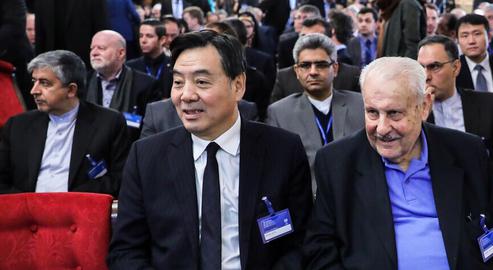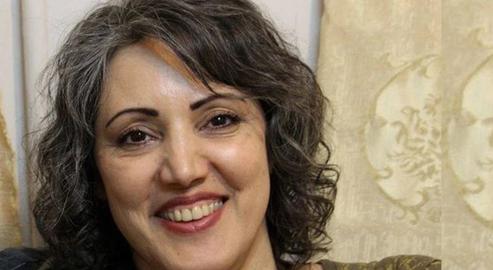Anis Naghash, a Lebanese citizen involved with overseas missions of the Islamic Revolutionary Guard Corps, the most famous of which was the failed assassination attempt on Shapour Bakhtiar, the last prime minister of Iran’s Pahlavi monarchy, died in Syria of Covid-19.
A bullet-proof iron door prevented the assassination of Shapour Bakhtiar, the exiled last prime minister of Iran before the 1979 Islamic Revolution, at his home in Paris on July 18, 1980. The gunman, who had been sent from Tehran to kill Bakhtiar – according to the plot of the Islamic Revolutionary Guard Corps (IRGC) and Sadegh Khalkhali, a revolutionary judge – killed one person near Bakhtiar's house and injured himself while also paralyzing a French police officer.
The gunman Anis Naghash, a Lebanese architect and an accomplice of the famed Venezuelan terrorist Ilich Ramirez Sanchez, better known as Carlos the Jackal, who had contacts with senior IRGC officials such as General Mohsen Rezaei and Brigadier-General Mohsen Rafiqdoust, was arrested by the French police guarding Bakhtiar. He was sentenced to life imprisonment. In his memoirs, he claims to have told French agents also in prison that each of them kill; but the difference between him and the French agents was that his killing was based on his beliefs. "You only act on the orders of your superiors,” he told the agents.
Naghash’s mission was left incomplete – just as Carlos’s was five years earlier when he attempted to take hostage ministers of Organization of Petroleum Exporting Countries (OPEC) in Vienna – though it did mark the start of the Islamic Republic's attempts at cross- border assassinations. During the hostage-taking of the OPEC ministers, in December 1975, Naghash was involved though Carlos was in charge of the operation.
Three Austrian and two French officers were killed during the attempted hostage-taking. Carlos demanded the ministers board a plane for Algeria. Jamshid Amouzgar, the head of the Iranian delegation to the OPEC meeting, was taken hostage along with other ministers. The demands of the hostage-takers were unknown and their plane diverted several times from Austria to Algeria. Carlos and Naghash became a familiar face to the French – so he was no stranger when he was arrested on charges of attempting to assassinate Bakhtiar.
Ten years after his arrest, and after the death of Ayatollah Ruhollah Khomeini, the leader of the Revolution, Naghash was pardoned by French President François Mitterrand. Iran’s new Supreme Leader Ayatollah Ali Khamenei, and President Akbar Hashemi Rafsanjani, had recently come to power. Naghash then went to Tehran. His release showed the Islamic Republic that it could take hostages and seek ransoms as part of its foreign policy.
The reason for Naghash's unexpected release is still unclear to most Iranian and French people. But Hashemi Rafsanjani revealed some details in his memoirs.
On February 5, 1989, after Naghash had been in prison for eight years, French Foreign Minister Roland Dumas visited Tehran and met with President Rafsanjani. Lebanon's Hezbollah had meanwhile taken several French and American nationals hostage in Lebanon – and everyone knew the influence Iran had on Hezbollah.
“The talks were normal during the formal meeting ... [Dumas] then requested a private meeting and I accepted. We had a private meeting in my office with Dr. [Ali Akbar] Velayati. We talked about human rights. We got the upper hand and said the Westerners and France themselves support terrorism against Iran, Lebanon, and Palestine, yet they insist on human rights. He asked about Anis Naghash and if [rival French politician] Jacques Chirac had pledged to release him. We said he did. It seems that he wanted to ... make a case for Mitterrand [instead of Chirac] to take action to release Anis [Naghash] in the future."
Chirac was France’s prime minister at the time and he later became president. During his tenure France made efforts to improve the Islamic Republic's relationship with the United States though the administration of then-US President George W. Bush refused.
Hashemi Rafsanjani’s notes also add that he said to Dumas during their meeting that, if Naghash was not released in France, the Lebanese had threatened revenge.
The Iranian president also sent a message via Dumas to the United States saying that, if the US released confiscated Iranian assets, the Islamic Republic would do its utmost to secure the release of American hostages in Lebanon.
Naghash was released shortly after the French foreign minister visited Tehran.
Ali Akbar Velayati, then Iran’s Minister of Foreign Affairs, said at the time of the Naghash's release: "We promised the French we would use all our influence to free the French hostages in Lebanon, and we kept our promise. Our special envoy promised to do things for us in return, including the pardon and release of Anis Naghash."
France’s Foreign Minister Dumas again returned to Iran after a meeting with Hashemi Rafsanjani who by this point was the speaker of Iran’s parliament. Rafsanjani was invited to Paris. He accepted the invitation – though it was decided that President François Mitterrand would first travel to Tehran. But even as preparations for the trip were underway, another group of Iranian agents carried out Naghash’s unfinished mission 11 years after the first attempt. Bakhtiar was assassinated in 1991 (the killer was apprehended) and Mitterrand's trip was canceled. But once again, 18 years later, Bakhtiar's killer was released in France and exchanged for a Frenchman imprisoned in Iran.
Naghash did not return to his home country of Lebanon after his release from prison in France; instead, he settled in Iran. He became a Middle East analyst, ran a business and construction projects, and as director of an Iranian think-tank he participated in official government programs at the Foreign Ministry.
During a political meeting in Tehran, which included Mohammad Javad Zarif and Yousef Ben Alavi after the 2015 nuclear agreement, Naghash was a special guest. He had expressed regret since the foiled assassination plot and said that the revolutionary judge, Sadegh Khalkhali, had let slip about the trip to Paris to assassinate Bakhtiar in a public speech.
Naghash had previously criticized Islamic Republic officials for not sufficiently defending Bakhtiar’s assassination – and in doing so he also gave striking details of the plot to the Fans news agency which is affiliated with he Islamic Revolutionary Guard Corps.
”In a meeting, where Mohammad Montazeri [son of Ayatollah Hossein Ali Montazeri] was also present, some information was provided about a coup [allegedly being planned by Bakhtiar]. I declared that Bakhtiar should be pursued and the coup should be neutralized. Mohammad Montazeri, as he did not have an organization under his leadership in those days, said the operation should be discussed with other agencies. Two days later, during a meeting, it was announced that the assassination had been agreed, but unfortunately Mr. Khalkhali made a mistake and announced in an interview that he had sent a commando to Paris to carry out Shapour Bakhtiar's death sentence."
Khalkhali's remarks caused Bakhtiar’s security to be enhanced. Naghash had said: "Shapour Bakhtiar did not answer the phone his appointments were canceled and his bodyguards were increased. The appointment I had made with him, which was supposed to end his life, was canceled, but I was immediately contacted from Tehran and told there was a strong concern about the coup and that Bakhtiar should be killed as soon as possible."
“The original plan for the first assassination attempt on Bakhtiar was to have an informal meeting at Bakhtiar’s home and to then gun down the Shah’s last prime minister,” Naghash added. “I prepared myself and went ... but [his people] were suspicious and did not open the door. I decided to break the lock with a bullet and go inside. But Bakhtiar's office door was bulletproof so there was nothing I could do. One of the two bullets that hit me belonged to my own weapon which ricocheted off the bulletproof door. Then I clashed with the French police and was shot again and arrested."
Anis Naghash is an important but a strange part of the history of the Islamic Republic. He was Lebanese engineer who collaborated with the Revolutionary Guards due to his own experience of taking hostages – and he was sentenced to life in prison for murder outside Iran.The Iranian government paid more for his release than the release of an Iranian citizen, and after providing the basis for his release, the government provided him with means to live in Iran as a result of his loyalty and his efforts to carry out a “holy” assassination.
visit the accountability section
In this section of Iran Wire, you can contact the officials and launch your campaign for various problems





























comments